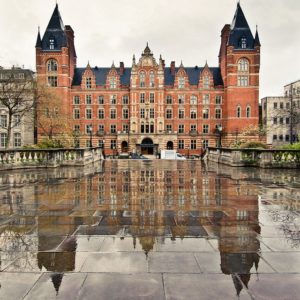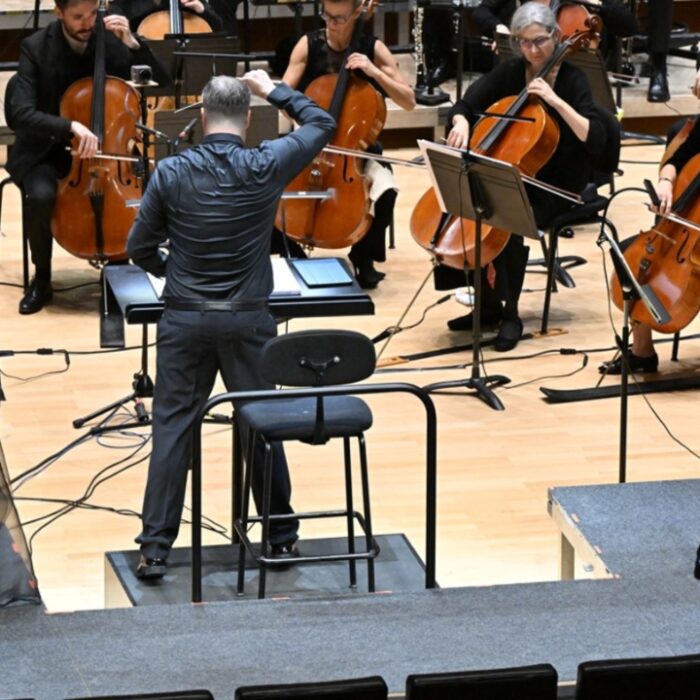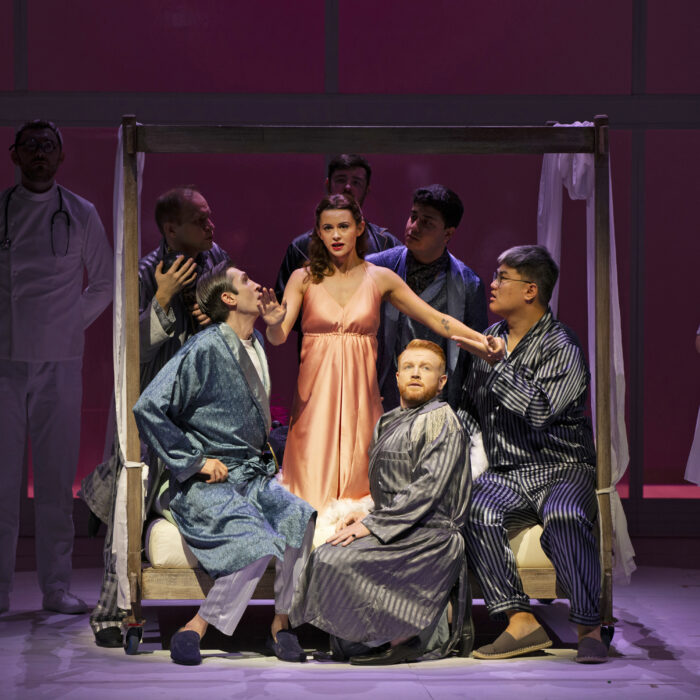
Royal College of Music 2021-22 Review: Flight
A Wonderful Performance of a Fantastic Modern Work
By John VandevertOn June 28th, amidst the calmness of a beautiful evening in London, held within the palatial confines of Britten Theater, the Royal College of Music Opera Studio performed Jonathan Dove’s third opera “Flight,” a humorous yet weighty story story about the going-ons of eight individuals at an airport terminal.
Although a student production, you wouldn’t have known this at all by the quality of the staging, singing, production, and certainly the orchestra (one of the strongest parts of the entire production).
A stone throw away from the bucolic Hyde Park and Kensington Palace (the former residence of both Queen Victoria and Princess Diana), Royal College of Music’s choice to perform this work was a refreshing take on the normal repertoire of student productions. Ranging from the monotonous Mozartian selections of “Cosi,” “Figaro,” and the like, to Humperdink’s “Hansel und Gretel,” “Die Fledermaus,” “L’Elisir d’Amore,” and Massenet’s “Cendrillon,” getting the chance to hear contemporary repertoire by the likes of NOT Glass, Muhley, Ades, or Heggie, further sung by a small cast of highly trained students (some being undergraduates remarkably) was as invigorating as it was motivating.
Knowing that the next generation of opera singers are being exposed to both “canon” repertoire and 20th-century repertoire is itself reason enough to smile.
Presiding over the performance was a team of exceptional individuals, conductor Michael Roswell and director Jeremy Sams effectively leading the creative and musical charge, with impressive lighting and video effects (James Whiteside and Matt Powell), along with naturally-styled choreography (Alyssa Noble) filling the performance with nuance, allusions, allegories, and organic reflections of the human condition. The intimacy of the hall was well-suited for this production, and by the size of the audience (the house was practically full!) most thought the same as well.
A choice that was particularly noteworthy was the usage of dimensional crossing (the refugee sitting on the stage looking out into the audience from time-to-time) and the projection of a Renzo-styled terminal, a subtle nod to his architectural philosophy of man’s unification with nature. Thus, late modernism coalesced with post-verismo musicality in an evening of splendor.
Inspired By a True Story
Inspired by the harrowing story of Mehran Karimi Nasseri, an Iranian refugee who had lived within the Charles de Gaulle Airport in Paris for 16 years, Jonathan Dove’s opera about the perils of an extended layover balances the comicality the composer is known for with a musical and narrative throughline of verismo-styled drama that gives his operas a feeling of relatability. The three-act work depicts the interactions between two couples, one honeymooning in efforts of reigniting their mutual infatuations, while the other are in-transit to Minsk (Belarus), an older woman anxiously awaiting the arrival of her older fiance, a steward and a stewardess, along with a forcefully sedentary refugee and the “Controller.” This latter character turns out to be, in fact, not merely an airport controller but an omniscient God-like figure whose superhuman control over the natural world provides the fuel to the opera’s central plot.
Although highly eminent Director Jeremy Sams noted the opera’s thesis as being, “about dreams, the surreal and the magical,” this hardly does justice to the complex network within this work. A balancing act between diverse themes like “the Fall of Man,” “existentialism angst,” and many shades of self-reflection and discovery, resulting in an operatic finale replete with Freudian catharsis out the wazoo, the opera can be read as the “rapture dream” of the unnamed refugee. Being stuck in an airport for so long with little chances for deep conversation and interpersonal connection, the disembodied voice of the controller could’ve become a tangible manifestation of God’s presence or even hope itself.
Using this reading, the opera’s supernatural plot of a “magical” stone which, at the end turns out was a normal stone, is not a “real” event but rather an intricately constructed illusion and the refugee’s tactic to escape from the demoralizing drudgery of social invisibility and the demonizing shuns of travelers going to and fro on a daily basis while he remains forever stuck in place. Although the opera does involve humor into its narrative, e.g., Bill (husband to Tina) and his gay affair with the Steward, a “party” ensemble with conga lines and limbo, and two fake “deaths,” the weightyness of the true narrative and its teachings far surpass the juvenile revelry. While certainly no “Marriage of Figaro” as Sams suggests, the opera does prove that philosophy doesn’t have to be boring to be operatic, and that opera (performed by students or otherwise) doesn’t have to be flippantly kitschy to be accessible.
Stars of the Show
The opera was performed by a 10-person cast and a eight-person ensemble, led in to by a seven-person artistic team, within the red velvet plushiness of Britten Theater. In the role of the refugee was countertenor Hugh Cutting, a rare occurrence in contemporary work. His brilliant adeptness at negotiating emotion, technique, and historics bodes well for his future career aspirations, and his upcoming debut at the Opernhaus Zürich will be something of merit.
In the role of the controller was soprano Clara Barbier Serrano, a spitfire French soprano whose exemplary upper range and technical cleanliness, with all the spunk of contemporaneity, substantiates her as a true soprano of the modern world. She’s fully involved in European new music, so there’s really no telling where she’ll go from here but it most certainly is up.
In the roles of Bill and Tina (the first couple) were American tenor Chris Mosz and Anglo-Venezuelan soprano Sofia Kirwan-Baez, two fantastic young voices whose individual spin, wide color pallet, and intrinsic lyricism is demonstrative of many years of dedicated practice, while acting wise naturality was their forte. Collectively, their strengths combined and gave this odd-ball couple more than a few touches of loving sincerity, making us fall in love with their quirks even more.
The roles of the Steward and Stewardess were sung by soprano Phoebe Rayner and baritone Edward Jowle, yet another example of high-caliber singing interpolated with dramaturgical refinement with a taste for nuance and subtlety. Their bios reflect their developed ability to balance technical precision alongside organic dramaturgy, a sought-after skill for the new and veteran alike.
In the role of the “Older Woman” was contralto Lexie Moon, an undergraduate although her ample yet unforced timbral depth, command of range and color, alongside an unrestrained vibrato and vocal fluidity paint her as far more adept than most undergraduates I’ve heard. With warmth and an uncontrived musicality to the line, dare I say the truly magical words “Bel canto,” I eagerly look forward to seeing her on stage again in the future.
Performing the roles of Minskman and Minskwoman (the second couple) were the baritone Theo Perry and soprano Emma Roberts, two more exceptional and strong young talents whose mutual and collective dynamism, both vocally and theatrically, far surpass held expectations of student-based opera productions, i.e., “good-but-still-training.” With his paternal bravado, a natural born Figaro it seems and her sensuously emotive allure, I am strongly convinced that opera’s next phase of existence will be a good one indeed.
Although it was a shame I couldn’t hear more of this fine singer, the role of Immigration Officer, sung by the bass Jamie Woollard, was handsomely sung and acted in a stern but caressing manner. Obviously at home as the voice of reason, his beautifully pedantic timbre and believable acting style was a much needed breath of fresh air.
Cannot Be Understated
In truth, the performance was intriguing for multiple reasons, but none the more flagrant than the extremely high quality of singing from every performer, and the inventive usage of lighting and projections that gave the performance a feeling of quintessential multidimensionality than contemporary opera is well-known for using. The collective brilliance of Matt Powell (video designer), Nick Shaw (designer), and James Whiteside (lighting designer) cannot be understated here. Succeeding in creating a tastefully postmodernist scene, the terminal replete with a gray-tiled tower, viewing station, and “wall” which then turned into a window of sorts where a series of realer-than-real projections were cast onto it, was a brilliant way at playing with technology in a non-obtrusive, and (dare I say) exclusively NON-Glassian style. Without forcing it onto the audience, the interpolation of relatability with the fantastic helped bridge the gap created in operatic theater, the “suspension of disbelief” starving many productions of allegorical impact due to the disunification of life and art. From planes taking off to planes landing, electrical storms, and angel wings, colored galaxies, and billowy clouds passing through a blue sky, I felt like the entire gamut of effects were being used to create a performance suitable for the modern, drama-voracious operatic audience.
Lighting was also very effective throughout the opera, a particular moment being in Act two when the Controller (a.k.a “God”) stood at the center of the stage with a singular spotlight on her, with the other characters flanking her sides in a V-shaped formation. Not only was this lighting effect highly impactful but dramatically, this was the moment when the Controller begins an extended demonstration of anger and contempt against the trapped travelers, itself a palpable allegory for God’s abhorrence at the selfish and egoistic nature of mankind.
Clara’s dramaturgical flexibility and her ability to vocally manifest heightened emotions without sacrificing technique in the process must be singularly noted here, as throughout Act 2 she cloaked every moment in a sublime ethos of subtext and introspection, never letting the audience indulge too far in histrionic superfluousness. Such profound undertones were complimented by arias and duets that spoke to our belief in hope, collective goodness, and virtuousness, even if they are obfuscated by callous desires. The rock, the “magical” element in the opera, becomes the antihero of the opera’s story, the biblical “Golden Calf,” which causes the characters to become distracted from much needed introspection. It’s later revealed that it was a quotidian stone but the impact it has on the characters is immense. During the night, each of the protagonists sung their raison d’etre for needing the stone, and it’s here where the entire cast’s brilliance really soared. The refugee, with his ethereal upper range, effective dynamic hushness, and paradoxically sturdy-yet-gossamer timbral fragility beckons the people to wish upon his “frozen star.” One by one, they sing but it is the solos of the Minkswoman and the Older Woman that both stole my heart and wouldn’t let go, as their majestic cries resonated throughout the hall. The lamenting desires of women who want to be free and just experience life without the strangled feelings of hesitancy.
However, Act two had many other stellar moments of vocal and dramatic excellence as well, although nearly every moment was positively sublime but one wouldn’t expect any less than perfection from RCM.
The female quartet between Tina, the Stewardess, Older Woman, and Minskwoman was superb and the collaborative energy was clearly evident, the vocalisms punctual, snappy, yet indulgent and flexible, while the comedic timing overall was never a moment early. To me, and certainly those to my left in the audience, the balance of light-hearted merriment and composed rumination was one of the production’s many strengths.
Each of the actors, especially Phoebe Rayner with a perfectly placed “I don’t like children” comment after being offered to carry Minkswoman’s newly born child in Act three, exuded a dramatic competency made stronger through the cogent usage of spontaneity and planned movements and interactions. Speaking of Act three, the highlight of the act was Minkswoman’s “reborn” aria after having given birth to the child she was hesitant of having. With a commanding presence and a lyrical richness which bespoke not only her character’s supreme honesty but Emma the woman and daughter off the stage, her awakened sense of self at the realization of her motherhood was astounding.
Overall, the performance was nothing short of spectacular, and an encouraging sign of the future of the operatic genre. I especially commend the internationally acclaimed costume designer Nicky Shaw for her decision to place Clara (a.k.a the Controller or perhaps “God”) in an austerly white, tea-length suit/dress combo with pointed shoulders. What a striking image against the gray hues of the background and the colors of the other cast! Further congratulations must be given to the ensemble, for whom the atmosphere would’ve been quite empty. Their energy, strong sound, and credible acting, was laudable considering that most reviews neglect choruses and ensembles, a censurable error indeed. Each element of the performance seemed to radiate an aura of careful consideration for their individual importance and its role in the larger framework of the operatic story, and yet the stage nor the performance was ever too busy.
Without trying to do 100 things at once, Sams and his team effectively revealed the intricate workings of the human psyche through easy paced dramaturgy and organized bouts of chaos. Never empty but never too full (as is the unfortunate case in most modern operas), Royal College of Music’s seminal status was confirmed as a training ground where youth come to become the best in their field. I look forward to seeing these young singers in the future, and highly recommend you do the same. In a time when we are inundated with those who profess the “Old World singing or else” mentality, the “New World” keeps moving forward. Those who ignore modern opera for ‘canon’ works, chastise modern opera singers for their ostensible ills, and rebuke ‘New World’ opera must only look towards places like RCM and the students therein to learn how wrong they are.


